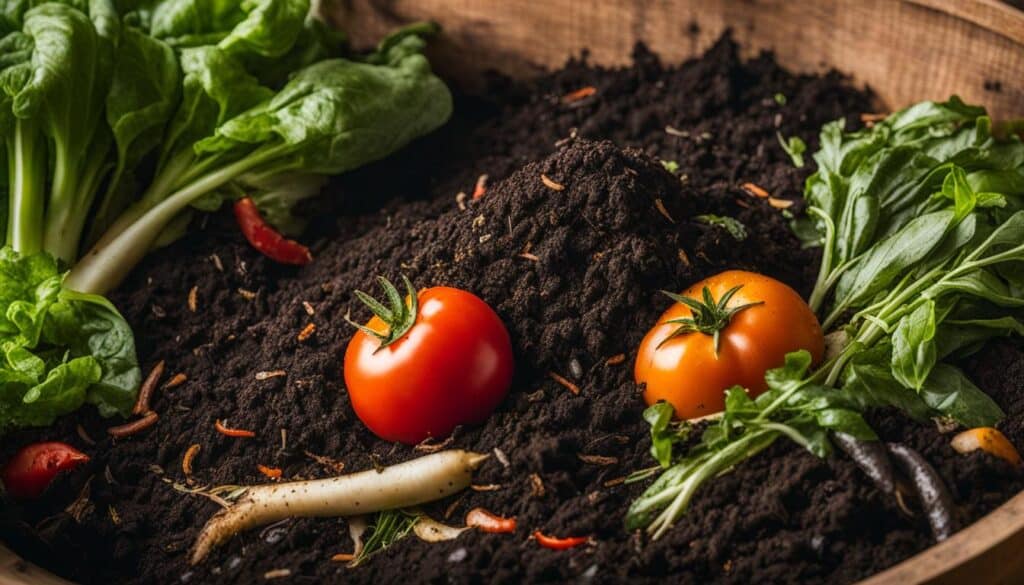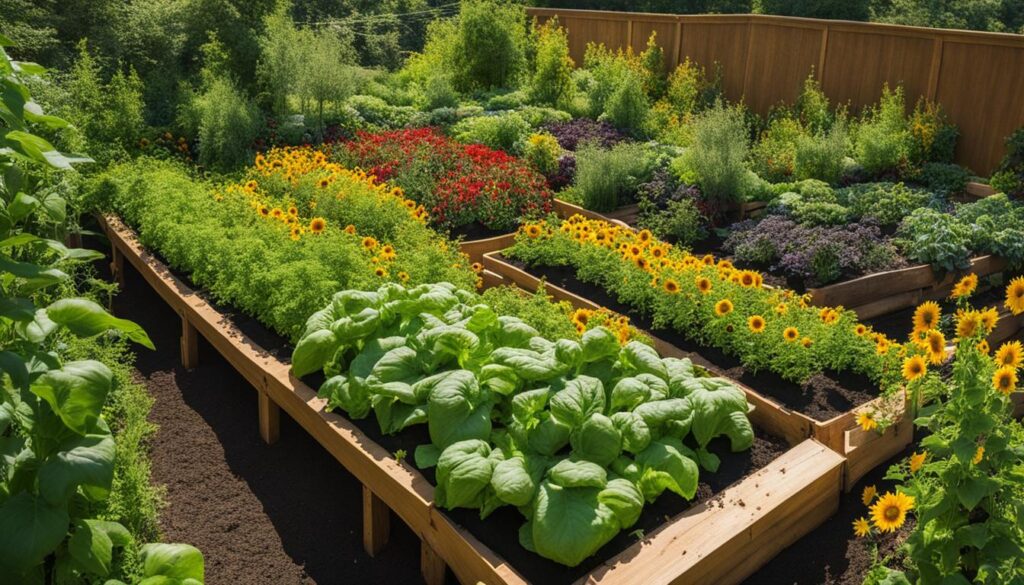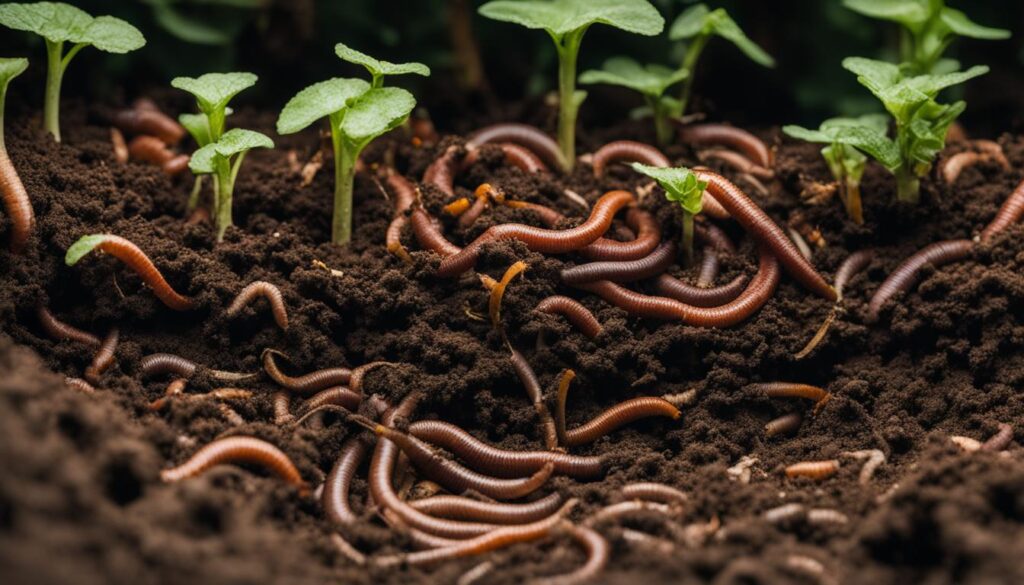Providing high-quality, nutrient-dense compost is essential for maintaining a healthy and high-producing vegetable garden. Not all compost is created equal, especially when it comes to growing vegetables. The best compost for your vegetable garden should be organic, made from decomposed organic matter, and free from herbicides, pesticides, and other harmful substances. It should contain a mix of organic materials, such as clover, coffee grounds, fruit scraps, grass clippings, leaves, and vegetable scraps. The compost should have a dark brown or black color, a smooth consistency, and a neutral, earthy smell. It should also provide the proper balance of nutrients and have a pH level suitable for vegetable plants. There are several options for bagged compost products on the market that meet these criteria and can be used in your vegetable garden. If you prefer to make your own compost, there are steps you can follow to create the best compost for your vegetable garden at home. By choosing the right compost for your vegetable garden, you can ensure healthy, productive plants and a bountiful harvest.
Read This For Imformation On The Different Types Of Compost.
Garden Composting:
- Choose organic compost made from decomposed organic matter without harmful substances for your vegetable garden.
- The best compost for vegetables contains a mix of organic materials and has a dark brown or black color with a neutral, earthy smell.
- Bagged compost products meeting quality criteria are available for easy use in your vegetable garden.
- Follow steps to create homemade compost using a mix of organic materials and proper maintenance.
- Using the right compost enhances soil fertility, structure, and moisture retention, leading to healthy, thriving vegetable plants.
The Best Compost for a Vegetable Garden?
When it comes to choosing the best compost for a vegetable garden, there are several factors to consider. Organic compost is the preferred option as it is made from decomposed organic matter and free from harmful substances like herbicides and pesticides. The ingredients in the compost play a crucial role in its quality and effectiveness. A good mix of organic materials such as clover, coffee grounds, fruit scraps, grass clippings, leaves, and vegetable scraps is essential. The compost should have a dark brown or black color, a smooth consistency, and an earthy smell. These characteristics indicate that the compost is well decomposed and rich in nutrients.
The nutrient density and pH level of the compost are also important considerations. The best compost for a vegetable garden should provide a balanced combination of essential nutrients like nitrogen, phosphorus, and potassium. Chicken manure, for example, is known for its high nutrient density. Additionally, the pH level of the compost should be suitable for vegetable plants. Conducting a compost test can help determine the nutrient content and pH level of the compost.
In summary, the best compost for a vegetable garden is organic, made from a variety of organic materials, and free from harmful substances. It should have a dark color, a smooth consistency, and an earthy smell. The nutrient density and pH level of the compost are crucial for healthy plant growth.
Table: Key Characteristics of the Best Compost for a Vegetable Garden
| Characteristics | Description |
|---|---|
| Organic | Made from decomposed organic matter and free from herbicides and pesticides |
| Ingredients | A mix of organic materials such as clover, coffee grounds, fruit scraps, grass clippings, leaves, and vegetable scraps |
| Color | Dark brown or black |
| Consistency | Smooth |
| Smell | Neutral and earthy |
| Nutrient Density | Provides a balance of essential nutrients like nitrogen, phosphorus, and potassium |
| pH Level | Suitable for vegetable plants |
Bagged Organic Compost for Your Garden
When it comes to choosing the best compost for your vegetable garden, bagged options can offer convenience and consistent quality. There are several excellent bagged organic compost products available that can provide the nutrients and benefits your plants need to thrive. Here are some top choices:
Blue Ribbon Organics OMRI Certified Natural Premium Organic Compost
This compost is a top choice for vegetable gardens, as it is made from a mix of recycled materials including brush, cut firewood, garden debris, grass clippings, leaves, sod, vegetable waste, and wood chips. It is OMRI Certified, ensuring that it meets organic standards and is free from harmful substances.
Wakefield BioChar Organic Premium Compost
With active fungi and bacteria, this compost provides beneficial microorganisms that can enhance your garden’s health. It is rich in nutrients and can improve soil structure and fertility.
Black Kow Organic Mushroom Compost
Utilizing composted soil used for growing mushrooms, this unique product is rich in organic matter and nutrients. It can enhance soil fertility and promote vigorous plant growth.
Dr. Earth Organic Compost
Best suited for larger gardens, this compost combines earthworm castings, alfalfa meal, oyster shell, and organic nutrients. It provides a balanced blend of essential nutrients and minerals for your vegetable plants.
When choosing a bagged organic compost, consider the specific needs of your vegetable garden and the ingredients that are important to you. Look for products that are free from harmful substances, nutrient-rich, and suited for organic gardening. These bagged compost options can help you create a thriving vegetable garden and achieve abundant harvests.
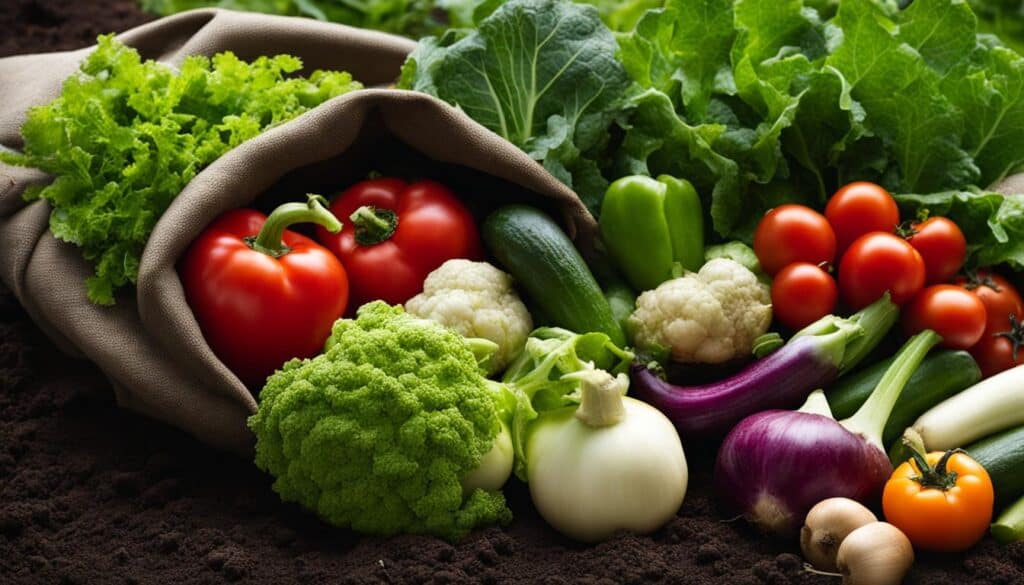
Make the Best Compost for Your Vegetable Garden
Creating your own compost for your vegetable garden can be a cost-effective and sustainable way to nourish your plants. By following a few simple steps, you can make high-quality compost that will provide essential nutrients and improve soil health. Here’s a guide on how to make the best compost for your vegetable garden:
Composting Process
The composting process involves the decomposition of organic materials into nutrient-rich compost. To start, gather a mix of green and brown materials. Green materials include grass clippings, vegetable scraps, and coffee grounds, while brown materials include leaves, straw, and wood chips. Layer the materials in your compost pile, ensuring a balance of green and brown. Add water to keep the pile moist, and turn it regularly to provide oxygen for decomposition. Over time, the organic materials will break down into rich, dark compost.
Compost Location
Choose a suitable location for your compost pile or bin. Ideally, it should be in a well-drained area with easy access to your compostable materials. The location should also be convenient for turning the compost and adding water. Consider using a compost bin or container to contain the materials and prevent them from scattering. This will also help regulate moisture levels and temperature, speeding up the composting process.
Compost Pile vs. Compost Bin vs. Compost Container
When deciding on the type of composting system to use, consider your space, convenience, and preferences. A compost pile is a simple and low-cost option, suitable for larger areas. Compost bins are more contained and organized, making them ideal for smaller spaces. Compost containers, such as compost tumblers, provide greater control over moisture and composting speed. Choose the option that best suits your needs and resources.
| Compost Pile | Compost Bin | Compost Container |
|---|---|---|
| Simple and low-cost | More contained and organized | Greater control over moisture and speed |
| Requires larger space | Suitable for smaller spaces | Convenient for limited spaces |
| Less control over moisture and speed | Requires regular turning | Speeds up the composting process |
Once your compost is ready, you can incorporate it into your vegetable garden to improve soil fertility and structure. Spread a layer of compost over the soil and mix it into the top few inches before planting. You can also use compost as a mulch around your plants to retain moisture and suppress weeds. Utilizing your homemade compost will help your vegetable garden thrive and provide you with a bountiful harvest.
What is Compost and Why is it Good for a Garden?
Compost is a mixture of decomposed organic materials, such as leaves, grass clippings, and food waste. It is a natural fertilizer and soil amendment that provides numerous benefits to a garden. One of the key benefits of compost is its ability to improve soil fertility. Compost is rich in essential nutrients, including nitrogen, phosphorus, and potassium, which are vital for plant growth. When added to the soil, compost releases these nutrients slowly, providing a steady supply for plants to absorb.
In addition to enhancing soil fertility, compost also improves soil structure. It helps to loosen compacted soils, allowing for better air circulation and water drainage. This creates an optimal environment for plant roots to grow and access nutrients. Compost also helps to retain moisture in the soil, reducing the need for frequent watering. It acts as a sponge, absorbing water and releasing it slowly, ensuring that plants have a constant supply of moisture.
Furthermore, compost plays a role in disease suppression. It promotes the growth of beneficial microorganisms in the soil, which help to suppress harmful pathogens. These microorganisms compete with disease-causing organisms, preventing them from gaining a foothold and causing plant diseases. Additionally, compost can help to neutralize soil pH and create a more balanced and healthy soil ecosystem.
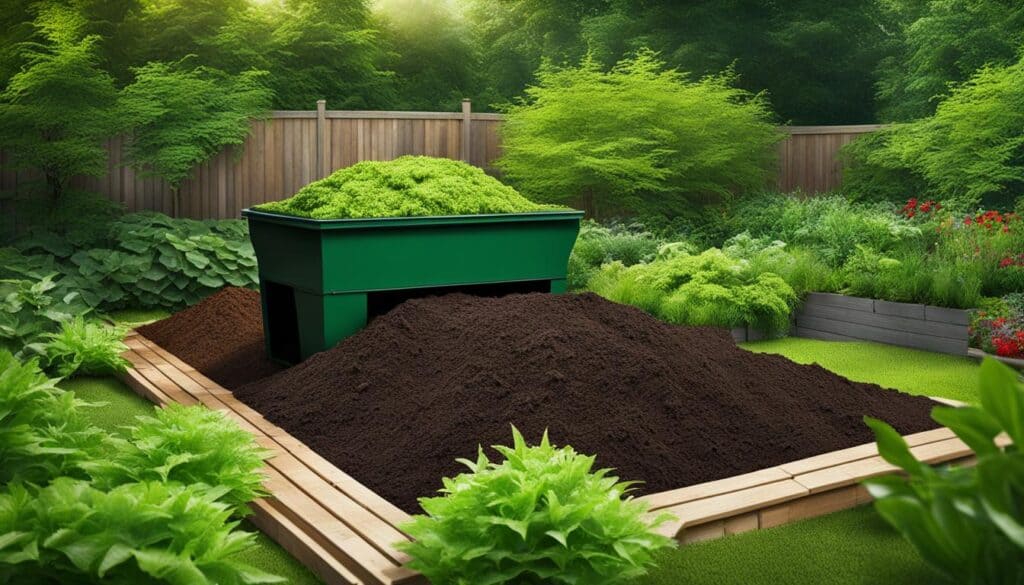
Overall, compost is a valuable resource for gardeners. It not only enriches the soil with essential nutrients but also improves soil structure, retains moisture, and helps suppress plant diseases. By incorporating compost into your garden, you can create a thriving and productive growing environment for your plants.
Use Compost to Enhance Your Vegetable Garden
Compost is a valuable resource that can be used in various ways to enhance your vegetable garden. Here are some effective ways to utilize compost to maximize the health and productivity of your plants:
- Compost as a Soil Amendment: Mix compost into your garden soil to improve its fertility and structure. Spread a layer of compost over the top few inches of soil and work it in thoroughly before planting. This will enrich the soil with essential nutrients, enhance water retention, and promote beneficial microbial activity.
- Compost as Mulch: Apply a layer of compost around the base of your plants to serve as mulch. This will help conserve moisture, regulate soil temperature, and suppress weed growth. Be sure to keep the compost a few inches away from the stems of your plants to prevent rot and disease.
- Compost Tea: Create compost tea by steeping compost in water. Use this nutrient-rich liquid to water your plants or as a foliar spray. Compost tea provides a concentrated dose of beneficial microorganisms and nutrients, promoting overall plant health and disease resistance.
By incorporating compost into your gardening practices, you can create a thriving and sustainable vegetable garden that produces abundant, healthy crops.
“Compost is the black gold of the garden – it nourishes the soil, supports plant growth, and reduces the need for synthetic fertilizers,” says gardening expert Jane Smith.
Remember to choose high-quality compost that is free from herbicides, pesticides, and other harmful substances. Whether you make your own compost or purchase it, ensure that it meets the necessary criteria for optimal performance in your vegetable garden.
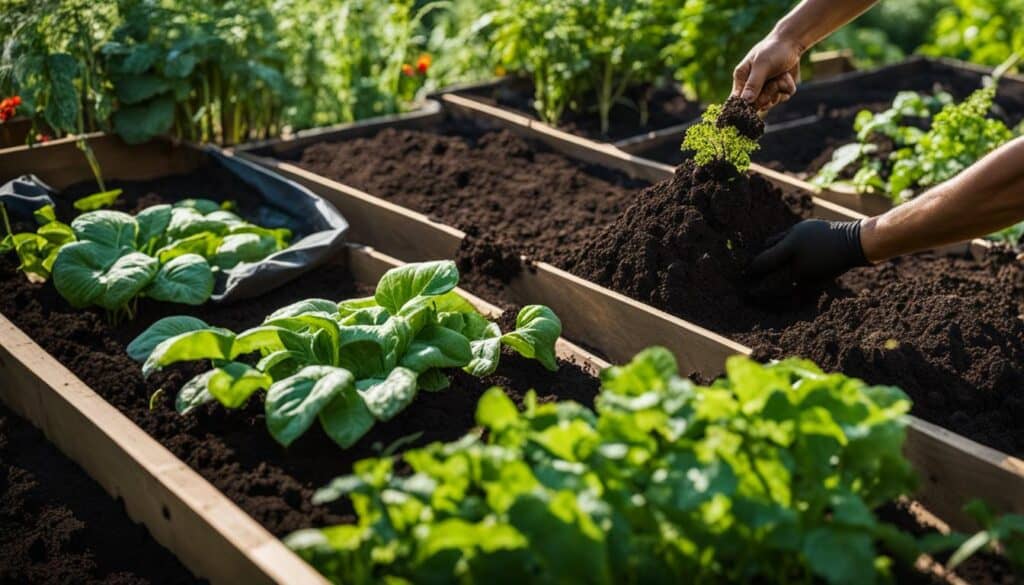
Comparing Different Types of Compost
| Compost Type | Benefits | Recommended Use |
|---|---|---|
| Homemade Compost | Contains a wide range of nutrients and beneficial microorganisms; customizable to your specific garden’s needs. | As a soil amendment, mulch, or in compost tea. |
| Bagged Organic Compost | Convenient and pre-packaged; meets organic standards; consistency and nutrient content may vary. | As a soil amendment or mulch. |
| Compost Tea | Provides a concentrated dose of nutrients and beneficial microorganisms; enhances plant growth and disease resistance. | As a liquid fertilizer or foliar spray. |
Each type of compost has its own advantages and recommended uses, so choose the one that best suits your gardening preferences and goals. Experimenting with different traditional composting methods and products can help you discover the most effective approach for your vegetable garden.
Best Homemade Compost for Vegetable Garden
When it comes to creating the best compost for your vegetable garden, making it at home can be a rewarding and cost-effective option. By composting at home, you have control over the ingredients and can ensure that your compost is organic and free from harmful substances. To get started, gather a mix of organic materials such as kitchen scraps, yard waste, and plant trimmings. Aim for a balance of green materials like grass clippings and vegetable scraps, and brown materials like leaves and straw. Layer these materials in a compost pile or bin, keeping it moist and turning it regularly to promote decomposition.
As the organic materials break down, they transform into nutrient-rich compost that will enrich your soil and provide essential nutrients for your vegetable plants. Homemade compost is a great way to improve soil fertility, structure, and water retention, all of which are crucial for healthy plant growth. By composting at home, you can reduce waste, save money, and create a sustainable source of organic matter for your vegetable garden.
Remember that composting at home requires some patience and attention to detail. It may take several months for the composting process to complete, depending on factors like temperature, moisture levels, and the mix of materials. However, the end result will be well worth the effort, as you’ll have a nutrient-rich compost that will help your vegetable garden thrive.
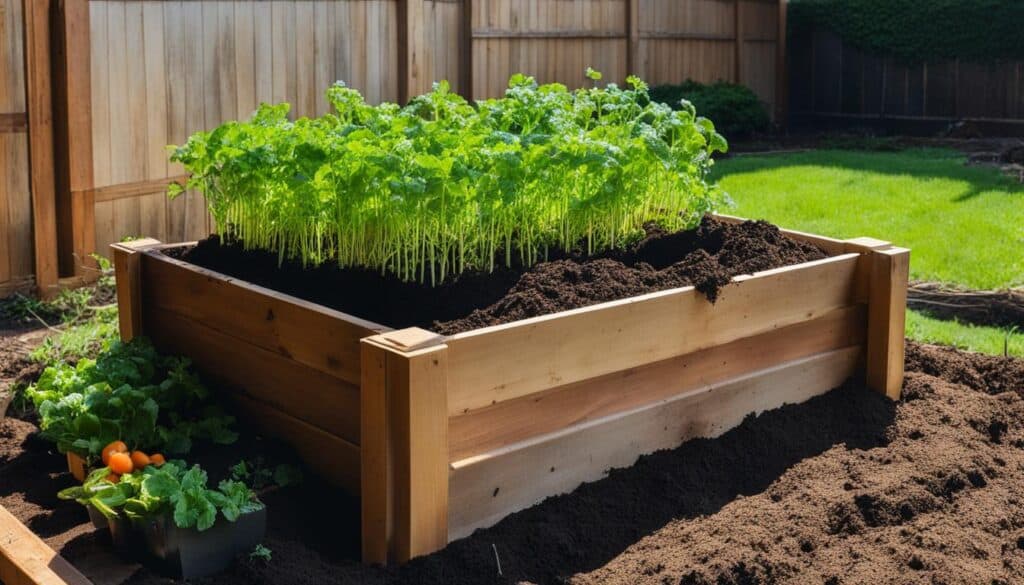
Table: Ingredients for Homemade Compost
| Green Materials | Brown Materials |
|---|---|
| Grass clippings | Leaves |
| Vegetable scraps | Straw |
| Coffee grounds | Wood chips |
| Plant trimmings | Sawdust |
| Manure (from herbivores) | Paper/Cardboard |
Source: Own elaboration.
Best Bagged Compost for Vegetable Gardens
When choosing bagged compost for your vegetable garden, it’s important to consider the quality and suitability of the product. Look for certified organic compost options that meet organic standards and are free from harmful substances. One top choice is the Blue Ribbon Organics OMRI Certified Organic Purpose Compost. It is made from a mix of recycled materials, including brush, garden debris, and vegetable waste, providing essential nutrients and improving soil structure. This compost enriches the soil by enhancing aeration, water retention, and soil pH, creating an ideal environment for vegetable plants to thrive.
For those seeking a unique option, the Black Kow Organic Mushroom Compost is worth considering. This compost utilizes composted soil used for growing mushrooms, resulting in a nutrient-dense product. Mushroom compost has gained popularity due to its rich nutrient content, providing plants with the essential elements they need for healthy growth. Another excellent choice is the Purple Cow Organics All Purpose Veggie Mix. This product contains natural and organic ingredients that promote robust plant growth, making it ideal for vegetable gardens.
When selecting bagged compost, it’s essential to consider the pH level of the product. Vegetables typically thrive in soil with a slightly acidic to neutral pH level. Ensure that the bagged compost you choose has a pH level compatible with vegetable plants. Checking the pH level can help you determine whether the compost is suitable for your specific garden needs. By choosing the best bagged compost for your vegetable garden, you can provide your plants with the nutrients they need for healthy growth and a bountiful harvest.
| Product | Description |
|---|---|
| Blue Ribbon Organics OMRI Certified Organic Purpose Compost | A mix of recycled materials, including garden debris and vegetable waste. Improves soil structure and provides essential nutrients. |
| Black Kow Organic Mushroom Compost | Utilizes composted soil used for growing mushrooms. Nutrient-dense and promotes healthy plant growth. |
| Purple Cow Organics All Purpose Veggie Mix | Contains natural and organic ingredients that enhance plant growth. Suitable for a variety of vegetables. |
Note: The pH level of the bagged compost should be suitable for vegetable gardens. Ensure compatibility with your specific plants.
Why is it Important to Avoid Using Peat Moss?
When it comes to composting for your vegetable garden, it is crucial to avoid using peat moss due to its negative environmental impact and its potential negative effects on soil quality. Peat moss is commonly harvested from peat bogs, which are important carbon sinks and habitats for various species. However, the extraction of peat moss destroys these habitats and releases carbon into the atmosphere, contributing to climate change. Moreover, peat moss is an unsustainable resource as it takes thousands of years to form and its rate of production is much slower than its rate of use.
Using peat moss in your compost can also have negative effects on your soil. Peat moss is naturally acidic and can make the soil more acidic, which may lead to nutrient deficiencies in plants and restrict their growth. Additionally, peat moss can contribute to soil compaction, especially when used in large quantities. This can hinder root development and the movement of water and air in the soil, negatively impacting plant health and overall garden productivity.
Instead of relying on peat moss, consider using alternative organic materials in your compost, such as leaves, grass clippings, vegetable scraps, and wood chips. These materials are readily available, sustainable, and can provide similar benefits to your soil without the negative environmental impact.
Table: Comparison of Peat Moss and Alternative Organic Materials for Composting
| Factors | Peat Moss | Alternative Organic Materials |
|---|---|---|
| Environmental Impact | Harvesting destroys habitats and releases carbon | Sustainable and readily available |
| Soil pH | Naturally acidic, can make soil more acidic | Neutral pH, no adverse effect on soil acidity |
| Soil Compaction | Can contribute to soil compaction | No adverse effect on soil compaction |
| Availability | Limited and slow to regenerate | Abundant and easily replenished |
| Cost | Can be expensive | Cost-effective or free |
By avoiding the use of peat moss in your composting practices, you can contribute to the preservation of valuable ecosystems, reduce carbon emissions, and promote sustainable gardening practices. Plus, you can create nutrient-rich compost that benefits your vegetable garden without compromising the overall health and productivity of your soil.
How to Make Your Own Compost
Composting is a simple and eco-friendly way to create nutrient-rich compost for your vegetable garden. By following a few steps, you can turn your kitchen scraps and yard waste into a valuable resource that will help your plants thrive. Here’s how to make your own compost:
1. Choose a Compost Location
Find a suitable location for your compost pile or bin. It should be easily accessible and well-drained. Consider placing it in a sunny spot, as the heat will help speed up the decomposition process.
2. Gather Compost Ingredients
Collect a mix of organic materials to create a balanced compost pile. Green materials, such as fruit and vegetable scraps, grass clippings, and coffee grounds, provide nitrogen. Brown materials, like dried leaves, straw, and wood chips, provide carbon. Aim for a ratio of roughly 3 parts brown to 1 part green materials.
3. Build and Maintain the Compost Pile
Layer the organic materials in your compost pile, alternating between green and brown layers. Keep the pile moist, like a damp sponge, to promote decomposition. It’s important to turn the pile regularly to introduce oxygen and speed up the breakdown process. Avoid adding meat, dairy, or oily items, as they can attract pests.
4. Harvest and Use the Compost
Over time, the organic materials will break down into dark, crumbly compost that smells earthy. This process can take anywhere from a few months to a year, depending on the conditions. Once the compost is ready, it can be used as a nutrient-rich soil amendment for your vegetable garden. Mix it into the soil before planting, or use it as a top dressing around existing plants.
By making your own compost, you not only reduce waste but also provide your vegetable garden with a sustainable source of nutrients. With a little time and effort, you can create high-quality compost that will nourish your plants and promote a healthy, productive garden.
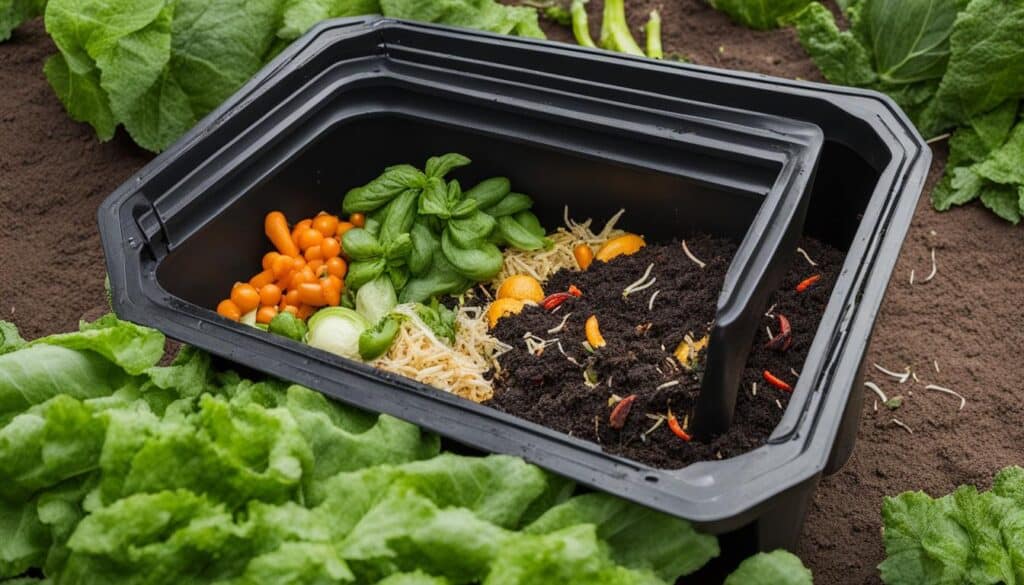
| Green Materials (Nitrogen) | Brown Materials (Carbon) |
|---|---|
| Fruit and vegetable scraps | Dried leaves |
| Grass clippings | Straw |
| Coffee grounds | Wood chips |
Conclusion
In conclusion, choosing the best compost for your vegetable garden is crucial for the health and productivity of your plants. Whether you decide to purchase bagged compost or make your own at home, there are key factors to consider. Organic compost that is free from harmful substances, such as herbicides and pesticides, is essential. It should be made from a variety of decomposed organic materials, like clover, coffee grounds, fruit scraps, grass clippings, leaves, and vegetable scraps.
When using compost in your garden, you can benefit from its ability to improve soil fertility, structure, moisture retention, and disease suppression. As a soil amendment, compost enriches the soil with vital nutrients and enhances its ability to hold water and nutrients. As mulch, it helps regulate soil temperature and reduce weed growth. Compost tea, a nutrient-rich liquid fertilizer made from steeped compost, can be used to water plants or as a foliar spray.
FAQ
What makes the best compost for a vegetable garden?
The best compost for a vegetable garden should be organic, made from a mix of organic materials, and free from harmful substances such as herbicides and pesticides. It should have a dark brown or black color, a smooth consistency, and a neutral, earthy smell. The compost should also provide the proper balance of nutrients and have a suitable pH level for vegetable plants.
What are some options for bagged organic compost for vegetable gardens?
Some top options for bagged organic compost for vegetable gardens include Blue Ribbon Organics OMRI Certified Natural Premium Organic Compost, Wakefield BioChar Organic Premium Compost, Black Kow Organic Mushroom Compost, and Dr. Earth Organic Compost. These products contain a mix of organic materials and provide the necessary nutrients for healthy plant growth.
How can I make the best compost for my vegetable garden at home?
To make the best compost for your vegetable garden at home, choose a location for your compost pile or bin, gather a mix of green and brown materials such as grass clippings and leaves, maintain the proper balance of materials, turn the compost regularly, and check the moisture level. With patience and proper maintenance, you can create nutrient-rich compost for your vegetable garden.
What is compost and why is it good for a garden?
Compost is a mixture of decomposed organic materials that enriches the soil with vital nutrients, improves soil structure, and helps with moisture retention. It acts as a natural fertilizer and soil amendment, promoting healthier and more vigorous plant growth. Compost also helps suppress plant diseases and pests, creating a balanced and healthy soil ecosystem.
How can I use compost in my vegetable garden?
Compost can be used as a soil amendment by adding it to the soil before planting, as a mulch around plants to conserve moisture and suppress weeds, and as a compost tea for watering plants or as a foliar spray. These methods help improve soil fertility, structure, moisture retention, and disease suppression in the vegetable garden.
What are some options for homemade compost for a vegetable garden?
You can make homemade compost for your vegetable garden by gathering a mix of organic materials, such as kitchen scraps, yard waste, and plant trimmings. Ensure a balance of green and brown materials, maintain moisture and aeration, and turn the compost regularly. Over time, the organic materials will break down into nutrient-rich compost for your vegetable garden.
What are some recommended bagged compost options for vegetable gardens?
Some recommended bagged compost options for vegetable gardens include Blue Ribbon Organics OMRI Certified Organic Purpose Compost, Black Kow Organic Mushroom Compost, and Purple Cow Organics All Purpose Veggie Mix. These products provide organic ingredients and promote healthy plant growth.
Why is it important to avoid using peat moss in compost?
It is important to avoid using peat moss in compost due to its negative environmental impact and potential negative effects on soil quality. Harvesting peat moss destroys habitats and releases carbon into the atmosphere. Peat moss is also an unsustainable resource that can make the soil more acidic and contribute to soil compaction when used in large quantities.
How can I make my own compost?
To make your own compost, choose a location for your compost pile or bin, gather a mix of organic materials, layer them in the compost pile or bin, maintain moisture and aeration, turn the compost regularly, and monitor its temperature. With time and the right conditions, the organic materials will break down into nutrient-rich compost for your garden.
What is the best compost for a vegetable garden?
The best compost for a vegetable garden should be organic, free from harmful substances, have a dark brown or black color, a smooth consistency, and a neutral, earthy smell. It should provide the proper balance of nutrients and have a suitable pH level for vegetable plants. By choosing the right compost, you can ensure healthy plant growth and a bountiful harvest.
Whether you choose to purchase or make your own compost, by making the right compost choice and using it effectively, you can create a thriving vegetable garden and enjoy a bountiful harvest. So, get started today and give your vegetable garden the best compost it deserves!

